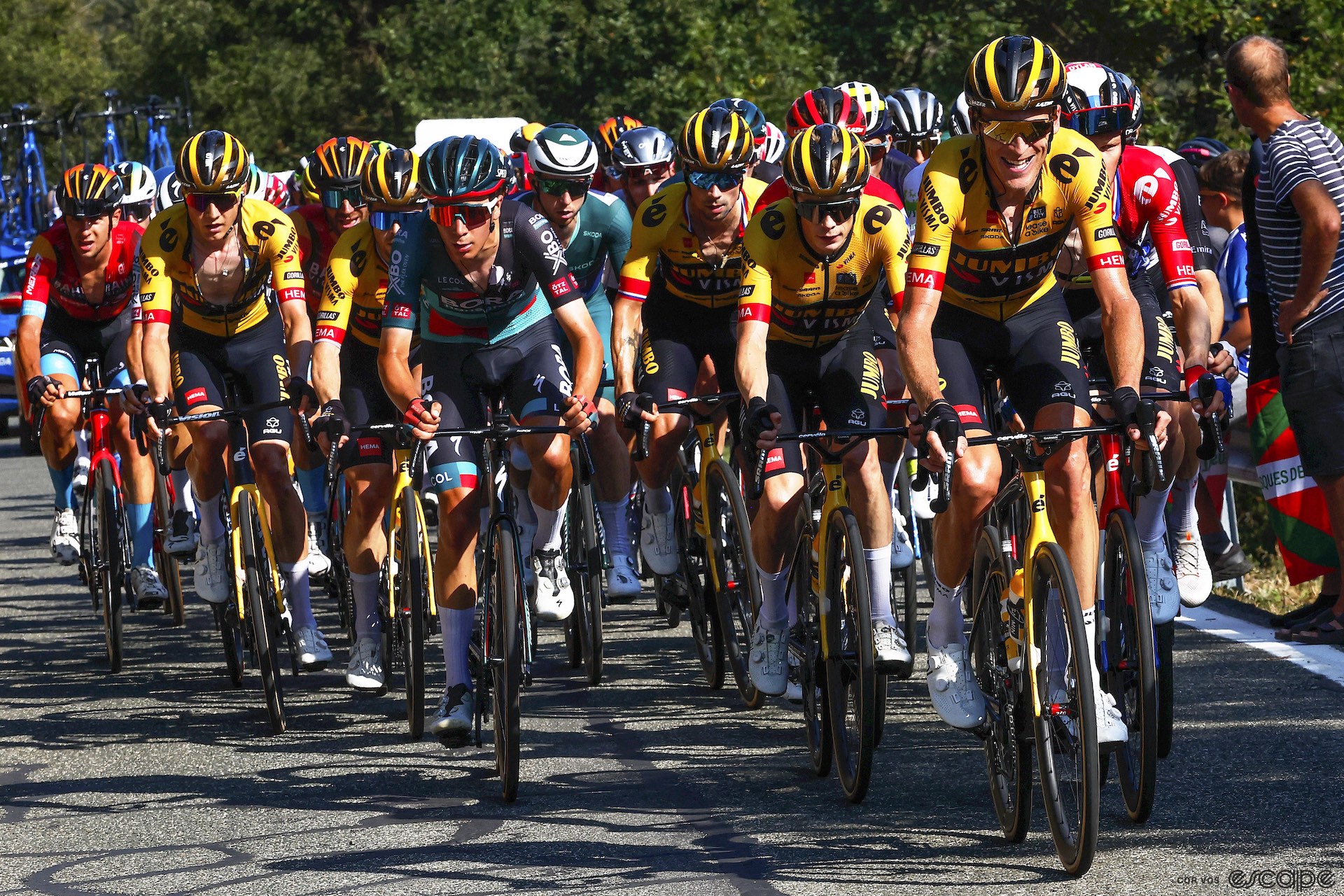The UCI has made big changes to the rules for rider transfers, clarifying the process for in-season transfers, pushing back the start of the traditional "transfer season," and implementing new (and massive) penalties for those who break contracts. The rules, which would apply to both men's and women's racing, still need to be formally approved by the Management Committee, but are already published on the UCI's web site.
Even before the new rules change, riders could and sometimes did switch teams within a season, like Arnaud Démare's move from Groupama-FDJ to Arkéa B&B Hotels in 2023. Moving forward, those transfers will still be allowed within a two-week window from August 1 to August 15. In another shift, the phrase "transfer period" is now changed to "registration period" and the framework for ensuring those transfers are undertaken with the consent of all parties involved has changed – more on that in a bit.
The more traditional transfer season, where riders and teams formally sign and announce who is riding for which team next season and beyond, has been pushed back. Until now, that period officially began on August 1, which has quite frequently led to awkward situations where riders either continue to ride for a team they have already announced they're leaving, or are instead simply left off of team rosters for key races later in the year.
The new rules bring cycling more in line with other sports where the transfer window starts at the end of the season; of the events on the men's and women's WorldTour calendars, only the Tour of Chongming Island and the Tour of Guangxi finish after October 15.
But definitions matter here. While teams aren't allowed to recruit riders outside the transfer window, the UCI defines "recruit" to mean "concluding a contract with the rider to ride for the UCI WorldTeam." That is, they're prohibited from signing a legally binding deal. In fact, this is one of the few sections on transfer rules that hasn't changed.
Given the way contract discussions tend to work, however, it's still a certainty that riders and teams will negotiate and reach agreements in principle for the next season well before the new transfer window opens. Teams and riders now have a longer negotiation period, but those contracts can't be officially signed until halfway through October rather than shortly after the Tour de France.
And further, that's not to say that all discussion of those transfers will get pushed back to October. The transfer rumor mill seems to churn earlier each year, and in a change to the old rules, teams and riders may now be able to openly acknowledge reports of talks. The old language that riders and teams "may not reveal that they are involved in negotiations about transfers outside the transfer period" has been struck from the rules entirely. That could mean that teams are now free to confirm or deny news of interest in a particular rider at any point in the season, and that's how a number of observers are reading the changes. Escape Collective has contacted the UCI for clarification on the change but has not yet heard back.
Along with those new dates set for contracts to be rolled out, the UCI also announced new penalties for breaches of contract, a move that comes in the wake of some high-profile contract disputes in recent years, including the one that saw Cian Uijtdebroeks leave Bora-Hangsrohe for Visma-Lease a Bike last year.
For starters, the new regulations bar teams from initiating transfer negotiations that would breach a rider's contract with their current team without first giving notice to that team. Previously, teams had to first notify the UCI's Pro Cycling Council and could then approach the rider's current team, or paying agent.
That's changed. Now, a team interested in poaching a rider from another squad "shall inform the rider’s current team of such intention before entering into discussions related to the envisaged contract with the rider." A new contract can only be signed after a transfer agreement is reached between all three parties and the UCI is provided with proof of termination of the old contract.
The UCI will also create a database of information that will maintain records on the lengths of contracts for UCI-registered riders as well as the names of their agent representatives.
Another change relates to penalties for breaching those rules. Previously, teams that attempted to sign a rider under an active contract without notifying that rider's current team would face a fine between CHF 30,000 and 500,000, with individual UCI licenceholders (team managers, riders, agents) also subject to fines between CHF 3,000 and 50,000. Approaches outside the transfer window could see those fines tripled. That's a wide range, and no longer applies.
Now, should a team ignore the rules and attempt to sign the rider without first informing their current team, both offending parties will face still-stiff but more narrowly defined set of fines, including being jointly liable for paying the rider's current team an amount equal to the leftover of the rider's salary (or an amount not less than six months the rider's salary) and paying a fine equal to three months of the rider's salary.
There are also new non-financial penalties: The offending team will "be subject to a ban from registering new riders for a period [of] 12 months." Finally, the rider will face a three-month suspension, and their agent will be fined and suspended as well.
In other words, where past contract breaches have typically only led to monetary consequences, moving forward, moves that see a rider break their contract will see penalties with potentially massive sporting effect levied upon the offenders. The one-year ban on registering new riders would be particularly onerous to a team, as that restriction could put a team's WorldTour license at risk if riders on existing contracts choose to leave for other teams and leave their old team below the Worldtour roster minimum threshold for the coming season.
All told, it's a sweeping overhaul of the rules for a system that, frankly, was in need of just that, given the potential for polemica within the previous framework that so often saw riders and teams make and break agreements at odd times and with sometimes controversial consequences. If other sports are any indication, even with robust regulations, athlete transfers can still generate plenty of news and drama, but the new rules are a step towards a more structured system for pro bike racing.
Did we do a good job with this story?



